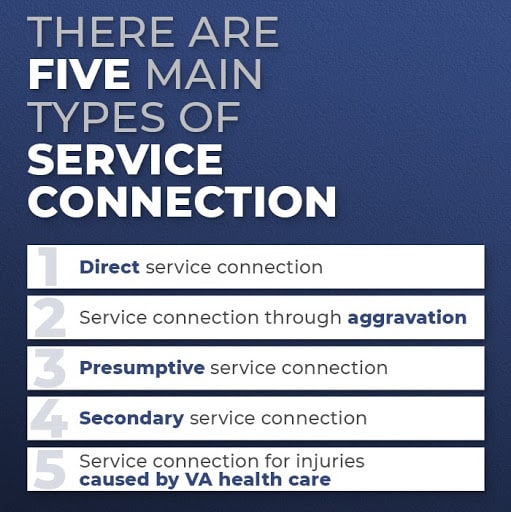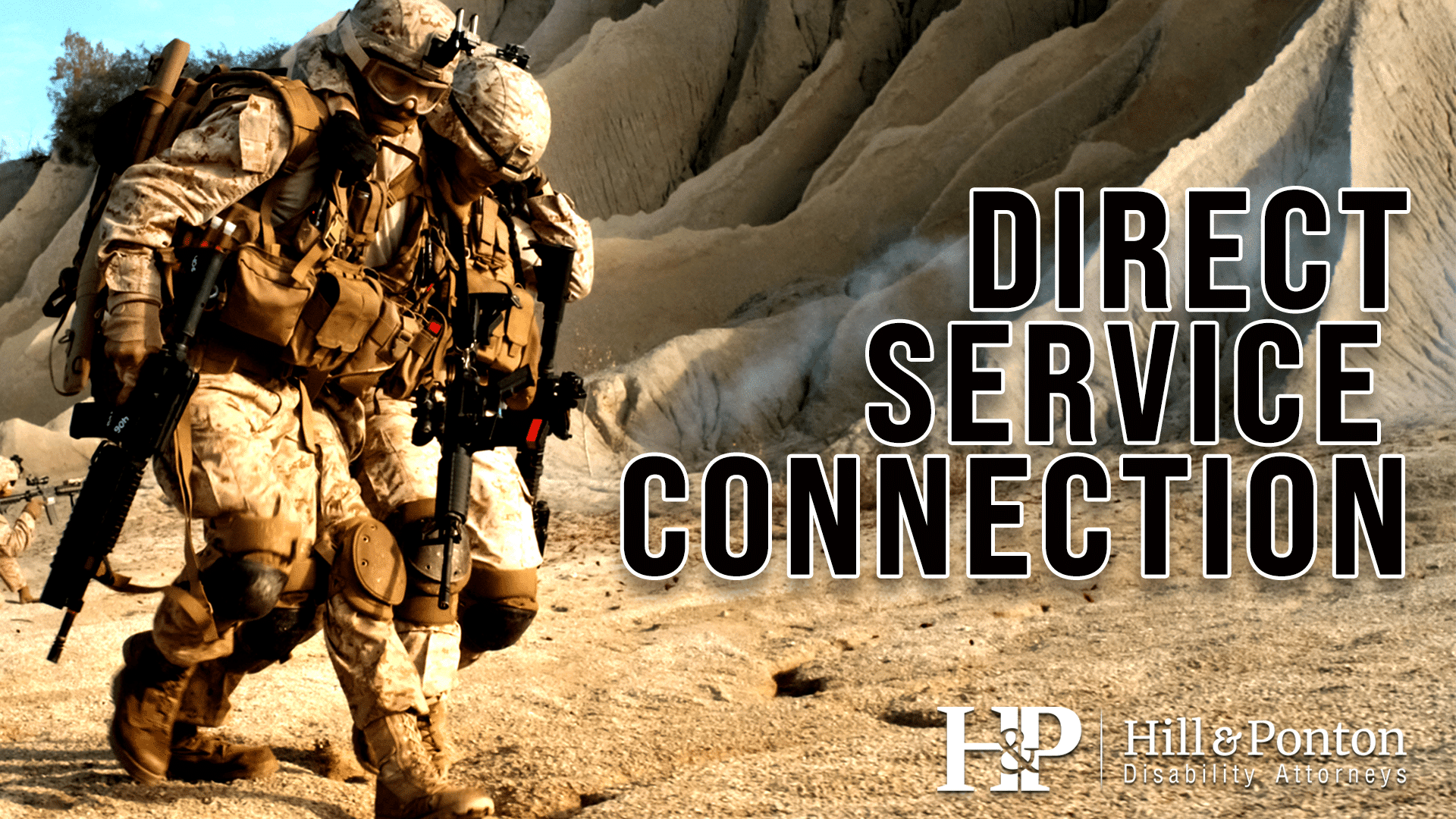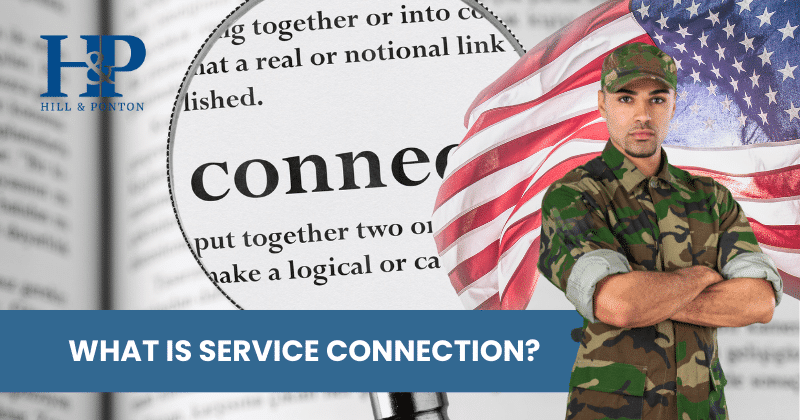Service connection is a key part of applying for disability benefits through the U.S. Department of Veterans Affairs. If you have had a disability since your time in service and believe that it is related to your service, then it is important in your VA claim to get that disability service-connected. Here’s what former service members should know about service connection.
What Is the Service Connection for a VA Disability?
In order to apply for disability compensation, disabled veterans need to show that their illness or injury resulted from military service in some way.
In simplest terms, when you are filing a claim for VA benefits, you are really asking the VA for “service connection” for a specific disease, injury, or disability.
For example, if you developed post-traumatic stress disorder from your time in active duty service, you would apply for disability compensation for that condition. During the claims process, you would present evidence to link your PTSD to your military service.
The term “service connection” seems like it should be simple enough, but the VA rules are anything but simple. We will go more into detail about how to prove service connection below.
What Benefits Can Veterans Receive Through Service Connection?
The most common benefit obtained by service connection is disability compensation. This is a monetary award in which you will be compensated a specific dollar amount based on several factors, including the severity of your disability, special compensation, and any persons you may claim as dependents.
This compensation can also be awarded on a monthly basis and retroactively applied as far back as to the date you first made your claim for your service-connected disability.
Also, the compensation for your disability is not subject to any state or federal income taxes.
In addition to monetary compensation, once a disability is service-connected, you are entitled to treatment at the VA Hospital for the specific condition at no additional cost.
This is important because this can save you hundreds to thousands of dollars in medical bills which you may have been responsible for out of your pocket.
You may also be able to apply for life insurance through the Service-Disabled Veterans’ Insurance Program (within two years of the grant of service connection).
Do VA claims have to be service connected?
For some disabling conditions, compensation is not always available if the disability is rated at 0%, considered non-compensable (see here for information on ratings).
However it is still very important and beneficial to you to establish the disability as service-connected because there are several other benefits other than monetary remuneration you may be entitled to (described above).
Further, if you have multiple (two or more) non-compensable service-connected disabilities, the VA is authorized to assign you a 10% disability rating if the disabilities clearly interfere with your normal employability.

How does VA determine service connection?
There are five main methods to establish service connection:
- Direct service connection
- Service connection through aggravation
- Presumptive service connection
- Secondary service connection
- Service connection for injuries caused by VA health care
By proving service connection in one of these ways, you can better support your VA disability claim and obtain VA disability benefits.
We will discuss each of these methods in turn.
Direct Service Connection
Direct service connection is the most common way that a veteran is able to establish a service connection for his or her disability.
Using this method, the veteran must show that he or she currently suffers from a disability that began during service.
You can generally show this through evidence like service medical records.
Direct service connection can also be established by showing that the veteran currently suffers from a chronic condition that began in service or that the veteran showed symptoms of, or was diagnosed with, a condition during service which developed into a current disability.
A medical opinion from a doctor which states that it is as likely as not that the current disability is linked to service, which is supported by reason and references the veteran’s medical record, is very helpful.
The VA is required to give a veteran the benefit of the doubt is there is equal evidence for both sides.

Service Connection Through Aggravation
The second way that service connection can be established is by service connection through aggravation.
Under this theory, a veteran can be awarded service connection for a preexisting condition that was noted in his or her military entrance examination and that was aggravated during active military service unless the VA is able to show that the condition is worsening because of the natural progression of the disease.
The veteran must show that the aggravation of the medical condition is a non-temporary increase in the severity of the underlying condition.
Again, the best evidence for this type of service connection is a medical opinion from a doctor which states that the aggravation of the condition was caused by service and not by the natural progression of the disease.
Presumptive Service Connection
Service connection can also be established by a presumptive service connection.
There are some disabilities that are presumed to be service-connected under certain circumstances.
These disabilities must appear within a certain period of time, which ranges from one year to any time after service depending on the disability, and some require the veteran to have served for a specific length of time, during a specific time period, or at a specific location.
There are special rules for a presumptive service connection for Agent Orange exposure and Gulf War veterans.
In order to establish a presumptive service connection, it is necessary to show that either the disability was diagnosed during the presumptive period or that symptoms of the disability manifested during that time, even if the diagnosis did not come until years later.
A medical opinion from a doctor who states that the symptoms during the presumptive period were a manifestation of the disability is essential, especially when combined with lay evidence from friends or family establishing that they observed such symptoms during that time period.
Secondary Service Connection
The fourth way that service connection can be established is through secondary service connection.
This is applicable where a service-connected disability causes an additional disability or aggravates a non-service-connected disability.
For instance, a veteran may have a service-connected back condition that results in a knee condition.
That knee condition may be considered secondarily service-connected.
Again, a medical opinion from a doctor linking the two disabilities is the best evidence for this type of service connection.
Service Connection Caused by VA Medical Care
The fifth way that service connection can be established is through a service connection based on VA medical care.
This type of service connection exists where there has been an injury or aggravation to an injury caused by VA hospitalization, VA medical surgery or treatment, a VA exam, or VA vocational rehabilitation.
With this type of service connection, the veteran (or eligible surviving family members if the veteran died as a result of VA medical care) can receive compensation benefits through a section 1151 claim or may pursue an action under the Federal Tort Claims Act.
What does service connected mean for VA?
Once your disability has been established as service-connected, then you have cleared one major hurdle in your fight to earn the benefits you deserve.
If the VA does grant a rating of non-compensable 0% for your disability that will not properly compensate you, then you are still able to appeal the rating decision and effective date while receiving the above mentioned benefits of having a your disability service-connected.
Finally if your disability does worsen after it is ruled as service-connected, you have the right to seek an increased rating, which means you are entitled to the compensation you deserve.
While there are several benefits you are able to receive if your disability is not service-connected, establishing service connection is the best path towards obtaining the benefits owed to you as a veteran who so faithfully served our county.
Can VA take away service connection?
Yes, the VA can take away service connected disability ratings from disabled veterans.
This usually happens when a veteran’s disability has improved or in the case of cancer, gone into remission.
Another common issue is if you’re qualified for TDIU but have a full time job.
Other times, VA will take away service connection if they find errors in your file and they awarded rating benefits that are too high for your actual symptoms.
In these scenarios, check out our VA proposed reductions blog.
Have Questions About Appealing Your Claim or Understanding How the Claims Process Works?
The attorneys at Hill & Ponton are here to support you with appealing a claim to get benefits.
If you are intending to appeal a denied claim, you can contact us for an evaluation and we can help you with this process.
However, if you are considering filing an initial claim, or even if you are interested in learning about the appeals process, we offer a free ebook to get you started on the right foot!
The Road to VA Compensation Benefits will help break down the claims process from start to finish. Click the link below to learn more.





